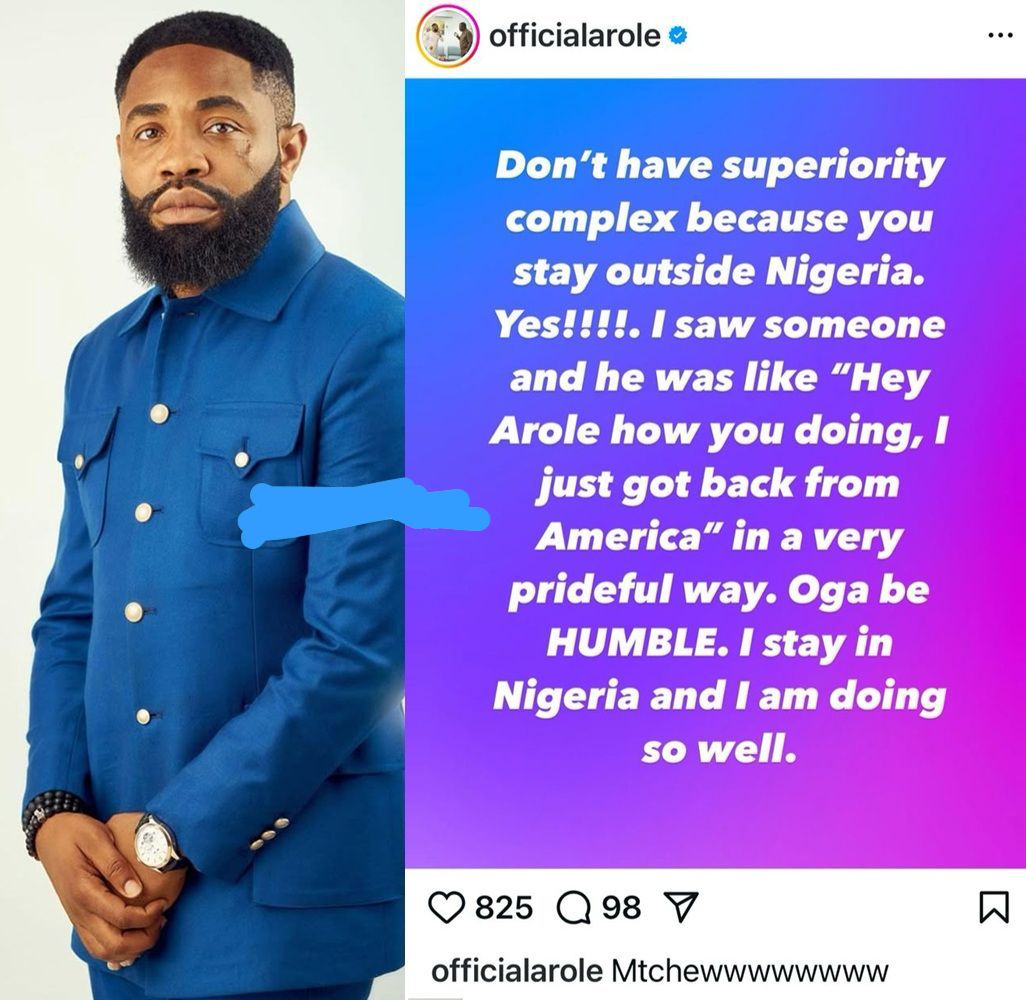
Woli Arole Warns Nigerians Abroad: Living Outside Nigeria Is Not a Badge of Superiority

Popular Nigerian comedian and actor, Woli Arole, has sparked conversations across social media after delivering a pointed message to Nigerians living abroad, urging them to drop any sense of superiority they might feel because of their location. In a passionate Instagram post, Arole addressed a growing trend he observed among some Nigerians in the diaspora who, according to him, act prideful when interacting with their fellow countrymen back home. His comments have resonated with many and stirred a wider debate about humility, success, and national pride.
Sharing his encounter, Woli Arole recounted a moment where he met someone who made it a point to announce that he had just returned from America, but did so in a manner dripping with arrogance. "Don't have superiority complex because you stay outside Nigeria," Arole wrote emphatically. "Yes! I saw someone and he was like 'Hey Arole how you doing, I just got back from America,' in a very prideful way. Oga, be HUMBLE. I stay in Nigeria and I am doing so well," he added, capping off his post with a dismissive "Mtchewwwwww" to emphasize his frustration.
The comedian’s blunt message quickly gained traction online, striking a chord with many Nigerians who could relate to similar experiences. In a time when relocating abroad is often celebrated as a major life achievement, Woli Arole's reminder served as a wake-up call: success is not tied to geography. For him, and for many who supported his statement, self-worth should not be based on where one lives, but rather on the value one adds to society, the level of happiness one attains, and the integrity with which one lives.
Reactions poured in from followers and fellow celebrities alike, with many applauding Arole for saying what others often shy away from. Some users pointed out that while traveling or living abroad can offer opportunities, it doesn't automatically elevate a person's worth or grant them moral authority over others. "Success is not imported," one fan commented. "You can build a meaningful, impactful life anywhere, including Nigeria." Others shared their personal stories of achieving financial stability, educational milestones, and personal growth without ever stepping outside the country.
The comedian’s remarks also reopened ongoing conversations about the pressures Nigerians sometimes face from friends and relatives abroad. From subtle jabs to outright condescension, many people back home report feeling looked down upon by those who believe life outside Nigeria is inherently superior. Woli Arole’s stance challenges that mindset, emphasizing that pride should come from personal achievements, resilience, and community contributions, not from a mere change of address.
Interestingly, Arole himself is no stranger to international exposure. Having traveled and performed in various countries, he understands firsthand the nuances of living abroad and the cultural dynamics involved. However, his experiences seem to have reinforced his belief in remaining grounded and staying connected to one’s roots, rather than looking down on others who have chosen a different path or remained in Nigeria.
In an era where the so-called "japa syndrome"—a term used to describe the mass migration of Nigerians seeking greener pastures abroad—continues to shape public discourse, Arole's words are especially timely. For many young Nigerians, relocating abroad is seen as the ultimate escape from the country's economic, security, and infrastructural challenges. Yet, Arole’s reminder underscores that personal dignity and respect must transcend these circumstances. He indirectly points out that while it’s perfectly fine to seek better opportunities abroad, it is equally important to maintain humility and respect for those who have decided to stay and thrive in Nigeria.
Several notable personalities have echoed similar sentiments in the past, but Arole’s message seems to have hit harder because of its raw and relatable delivery. Known for his humor and straightforwardness, the comedian’s ability to blend serious commentary with entertainment gives weight to his observations. His influence, particularly among young Nigerians, made his post go viral within hours, appearing on blogs, Twitter threads, and WhatsApp statuses across the country.
Critics, however, argue that Arole may be oversimplifying the situation. Some believe that Nigerians abroad often face immense pressure to justify their moves, leading them to overcompensate when they return home. They suggest that what comes across as arrogance might sometimes be a mix of excitement, relief, and a desperate need for validation after enduring cultural shocks, racial prejudices, and economic hardships overseas. Others argue that while humility is essential, it is equally important for those at home not to feel automatically defensive when interacting with returnees.
Despite these differing perspectives, the core of Arole’s message remains clear: no one should measure their importance by geography. Whether you are thriving in Lagos, hustling in New York, or making ends meet in Manchester, what matters most is the impact you are making, the people you are uplifting, and the authenticity with which you live your life. Staying humble, regardless of status or location, is a timeless principle that crosses borders.
As more Nigerians continue to travel and migrate, both for education and work, Arole’s statement serves as a timely reminder to stay grounded. In a world increasingly obsessed with appearances and labels, it takes courage to speak out against subtle societal pressures that equate success with location. The comedian’s words encourage everyone, whether at home or abroad, to redefine success on their own terms and remember that respect and humility will always speak louder than any passport stamp.
Woli Arole’s bold call for humility might not sit well with everyone, but it has undeniably ignited an important conversation about pride, identity, and self-worth among Nigerians globally. Whether in the bustling streets of Lagos or the quiet suburbs of Atlanta, the principle remains the same: be proud of who you are, not just where you are.


